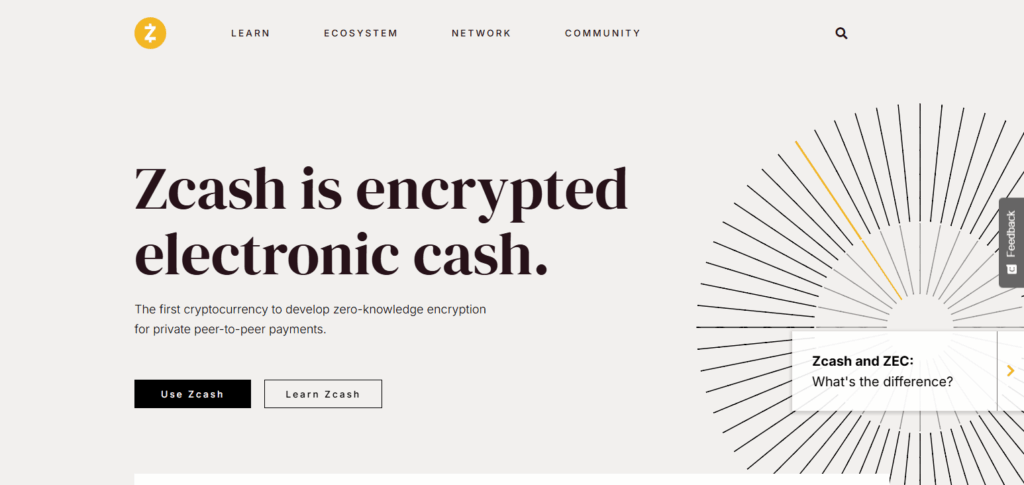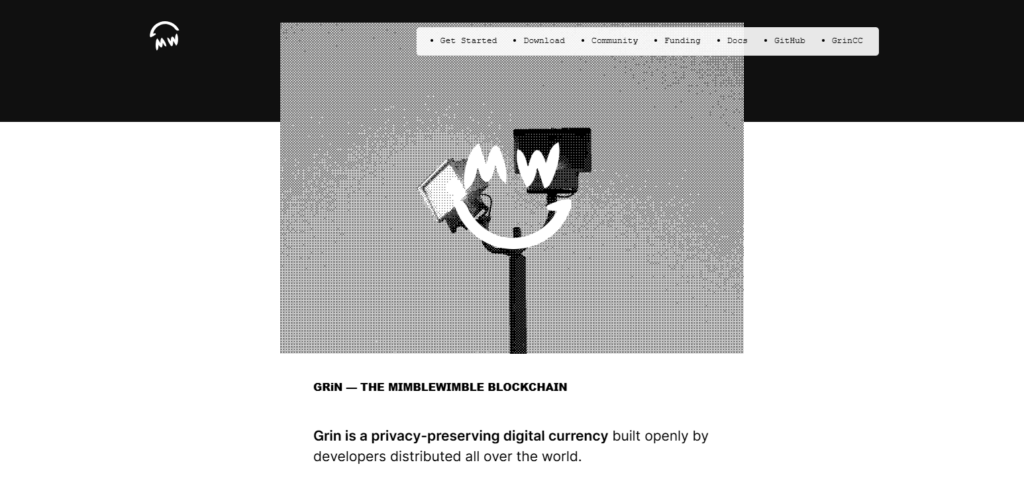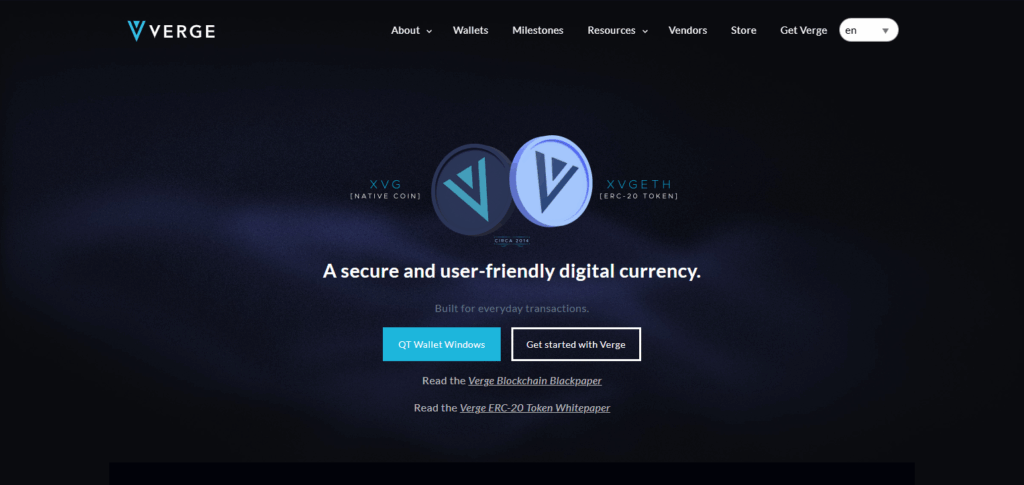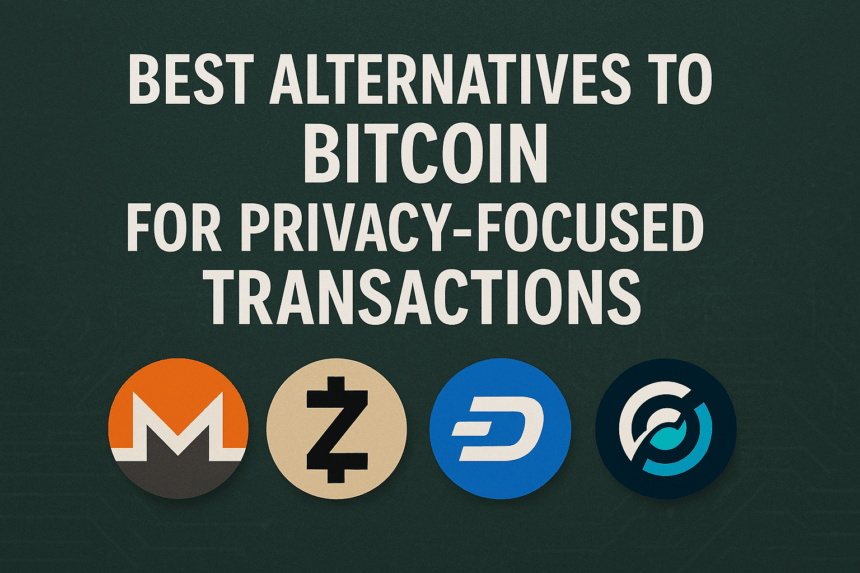In this article i will talk about the Best Alternatives to Bitcoin for Privacy-Focused Transactions. While Bitcoin is not completely secure various other cryptocurrencies offer increased anonymity with advanced technology like zk – SNARKs, RingCT and Mimblewimble.
These coins are created to secure the identities of users, transaction information and the history of wallets which makes them perfect for those who want complete security and privacy. They also offer decentralized solutions.
Key point & Best Alternatives to Bitcoin for Privacy-Focused Transactions
| Coin Name | Key Privacy Feature |
|---|---|
| Monero (XMR) | Default privacy with stealth addresses, RingCT, and bulletproofs |
| Zcash (ZEC) | Optional shielded transactions via zk-SNARKs |
| Dash (DASH) | PrivateSend coin mixing for enhanced privacy |
| Beam (BEAM) | Mimblewimble protocol with confidential transactions |
| Grin (GRIN) | Mimblewimble-based scalability and identity-hiding |
| Firo (FIRO) | Lelantus tech with full anonymity using zero-knowledge proofs |
| Pirate Chain (ARRR) | Privacy enforced by default using zk-SNARKs |
| Verge (XVG) | Uses Tor and I2P to hide IP addresses (network-layer anonymity) |
| Navcoin (NAV) | Dual blockchain for optional private and transparent transactions |
| Incognito (PRV) | Shields transactions across cryptocurrencies using Incognito Wallet and DEX |
10 Best Alternatives to Bitcoin for Privacy-Focused Transactions
1. Monero (XMR)
Monero is the standard for privacy-oriented digital currencies, using sophisticated cryptographic techniques to guarantee total privacy. It makes use of stealth addresses to create one-time addresses for every transaction, concealing the identity of the person receiving it.
Ring Confidential transactions (RingCT) conceal the amount of transactions as well as ring signatures that combine multiple signers to hide the sender. Bulletproofs can further improve the efficiency of transactions without jeopardizing security.

Being one of the top alternative to Bitcoin for transactions with a focus on privacy, Monero stands out for its mandatory privacy – unlike Zcash’s alternative model, which guarantees every transaction is traceable through its Blockchain.
Monero’s solid privacy, continuous growth, and broad adoption makes it the perfect choice for people who prefer untraceable financial transactions by 2025. The community-driven model ensures continuous improvement.
Monero (XMR) Features
- Stealth addresses disguise the identities of recipients
- Ring Confidential Transactions (RingCT) hide the amount of transactions
- Bulletproofs increase privacy and allow for scalability.
- Privacy is turned on by default with every transaction
- Refusive to tools for analysis of blockchain
2. Zcash (ZEC)
Zcash is a cutting-edge cryptocurrency that provides privacy via zero-knowledge proofs known as zk-SNARKs. They are providing shielded transactions that secure the sender, the receiver, as well as the amount.
In contrast to Monero privacy, privacy is a choice with the option to select among clear (Bitcoin-like) or secured transactions. This choice is suitable for a variety of situations, but will require users to choose privacy, in contrast to Monero’s default privacy.

It is among the top options to Bitcoin for privacy-sensitive transactions Zcash’s zk -SNARKs offer an encryption method that is mathematically verified, however the privacy option is not as popular for transactions that are completely private when compared against Monero as well as Pirate Chain.
Zcash’s solid cryptographic foundation and ongoing development makes it an ideal option for those who are concerned about privacy in 2025, while balancing the need for transparency and privacy.
Zcash (ZEC) Features
- ZK-SNARKs can enable transactions that are shielded
- Users have the option of choosing between private or transparent transactions
- A strong cryptographic design that is that is backed by research conducted in the academic community
- allows selective disclosure during audits or for compliance
- It is suitable for regulated and private users
3. Dash (DASH)
Dash was originally was a Bitcoin fork, improves security by utilizing its PrivateSend feature that makes use of CoinJoin to mix transactions while concealing their source. Contrary to Monero’s requirement for privacy, Dash’s method utilizes masternodes to allow mixing, resulting in an enhanced level of pseudonymity, not full anonymity.

As one of the top options to Bitcoin for transactions with a focus on privacy, Dash provides a lighter security layer than Zcash’s non-traceable transactions and Monero’s zk-SNARKs. It is therefore less reliable for total anonymity.
However, its speedy transactions and a user-friendly platform attract those who are looking for moderate privacy while still being usable. The year 2025 is when Dash continues to be popular because of its speed and convenience as well as low fees and the option of privacy, but it’s not as secure as the top coins.
Dash (DASH) Features
- PrivateSend feature allows for optional mixing of coins
- InstantSend is fast and secure for transactions
- Works on a two-tiered system, with masternodes
- It prioritizes speed and anonymity, but also allows for optional privacy.
- It is widely accepted in all day merchant transactions
4. Beam (BEAM)
Beam uses its Mimblewimble protocol to ensure security and privacy that is robust as well as the ability to scale. It blocks address reuse by creating one-time addresses. It also makes use of confidential transactions to hide amounts, guaranteeing the anonymity of both the sender and receiver.

In contrast to Bitcoin’s transparent blockchain Beam’s design is able to eliminate unnecessary data, thus enhancing security. Being one of the best options to Bitcoin for transactions that are focused on privacy, Beam offers robust anonymity like Grin however, it focuses on user-friendly wallets, in contrast to Monero’s broader ecosystem.
Beam’s light-weight blockchain increases efficiency, making it a great choice for those who are concerned about privacy in 2025. While it’s not as popular as Monero Beam’s unique approach and its active development position it as a potential privacy coin to use for private, secure transactions.
Beam (BEAM) Features
- Makes use of Mimblewimble to provide privacy and flexibility
- Confidential transactions without address reuse
- Lelantus-MW to enhance anonymity
- Dandelion++ protocol hides user IPs
- Privacy by default and wallets designed for users
5. Grin (GRIN)
Grin, based using its Mimblewimble protocol, is a system that prioritizes security and scalability, by eliminating the blockchain’s identifiable data. It utilizes encrypted transactions to conceal the amount and prevent addresses that are reused, which ensures the anonymity of both the sender and the receiver.

Contrary to Bitcoin’s traceable ledger Grin’s layout minimizes storage for data but still ensures security. It is among the top alternative to Bitcoin for transactions that are private, Grin shares Beam’s Mimblewimble base, but it focuses on open-source development, in contrast to Monero’s more widespread use.
Grin’s lightweight blockchain is perfect for users looking for private, secure transactions by 2025. While it’s not as user-friendly as Beam however, its commitment to privacy and decentralization makes it an ideal choice for those who value the privacy of financial transactions over accessibility to mainstream.
Grin (GRIN) Features
- Mimblewimble protocol eliminates blockchain-related information
- Transactions are private and not traceable
- There are no addresses or amounts to be stored on the chain
- Blockchain that is highly scalable and light
- Concentrate on the simplicity of your design Privacy, simplicity, and the long-term viability
6. Firo (FIRO)
Firo also known as Zcoin is a cryptocurrency that uses the Lelantus protocol, which uses zero-knowledge proofs that conceal the source of transactions as well as the amount. This guarantees complete anonymity by permitting the users the ability to “burn” the coins to then redeem the coins without tracing them, thus by breaking links between transactions.

In contrast to Bitcoin’s pseudonymous blockchain Firo provides a robust level of privacy with no address reuse. As one of the top options to Bitcoin for transactions that are privacy-focused Firo’s Lelantus is comparable to Monero’s RingCT but with a lower number of users.
The company’s emphasis on scaling privacy-focused solutions makes it attractive for 2025. Firo’s constant growth and its privacy-first strategy position it as a formidable contender for those who want safe, anonymous transactions although it isn’t as popular as Monero in its adoption.
Firo (FIRO) Features
- Lelantus protocol guarantees complete anonymity
- Burn-and-redeem model breaks transaction links
- Dandelion++ obfuscates user IP addresses
- Masternode help to ensure stability of the network and good governance
- Research-driven, strong privacy roadmap
7. Pirate Chain (ARRR)
Pirate Chain enforces mandatory privacy by using zk-SNARKs to ensure that every transaction is anonymous, including the sender, recipient, and amount. In contrast to Zcash’s private option, Pirate Chain eliminates transparent transactions and provides maximum privacy.

The blockchain was made to be totally untraceable and surpass Bitcoin’s pseudonymity. It is one of the top alternative to Bitcoin for transactions with a focus on privacy, Pirate Chain rivals Monero’s anonymity, but it uses ZK-SNARKs rather than ring signatures and is appealing to those who want absolute security.
In 2025, its emphasis on privacy-related requirements will make it a great choice for transactions with high security, but its small ecosystem makes it less popular in comparison to Monero. Pirate Chain’s uncompromising stance on privacy guarantees it to be a top option for those who value anonymity.
Pirate Chain (ARRR) Features
- ZK-SNARKs protect privacy by default
- 100 percent of transactions are secured
- There is no option to make transactions transparent
- Delayed Proof of Work (dPoW) ensures the chain’s security via Bitcoin
- The most private cryptocurrency accessible
8. Verge (XVG)
Verge is a proponent of network-layer security through the integration of Tor as well as I2P to hide the IP addresses of transactions. Contrary to Bitcoin’s transparent Blockchain, Verge hides user locations but its on-chain privacy is less robust, with no mechanisms to hide the amount or addresses.

It is among the top alternative to Bitcoin for transactions that are privacy-focused Verge’s privacy at the network level isn’t as robust as Zcash’s blockchain-level privacy, or Monero’s zk-SNARKs. It is therefore not suitable for those who value IP anonymity over total transaction security.
In 2025 Verge’s simplicity and low-cost transactions are appealing to those who value privacy, however its limited privacy on the blockchain is not as competitive with other coins such as Monero and Pirate Chain for fully anonymous transactions.
Verge (XVG) Features
- Make use of Tor along with I2P to conceal IP addresses.
- Provides a variety of stealth addresses that can be addressed
- Five mining algorithms are supported for decentralization
- It focuses on identity protection in real-time.
- Fast and light-weight transaction system.
9. Navcoin (NAV)
Navcoin provides privacy options through an encrypted subchain and allows users to select between transparent and anonymous transactions. Contrary to Bitcoin’s pseudonymous Blockchain, the private subchain of Navcoin hides the details about the receiver and sender however its privacy isn’t as sophisticated than Monero’s.

It is one of the top options to Bitcoin for transactions that are privacy-focused, Navcoin’s dual-blockchain approach offers flexibility, but it is not as robust as Zcash’s obligatory privacy and Monero’s zk-SNARKs for its robustness.
In 2025, Navcoin’s easy-to-use interface and optional privacy will be a great choice for users who are new, but its smaller population and less sophisticated security features limit its appeal in comparison to high-end privacy coins such as Monero as well as Pirate Chain for users seeking absolute privacy.
Navcoin (NAV) Features
- Dual blockchains with NavTech to allow for security
- Transparency is encrypted separately from the chain itself
- Energy efficient Proof of Stake consensus
- Supports public and anonymous transactions
- Community-driven and user-friendly interface
10. Incognito (PRV)
Incognito is a sidechain that protects transactions of multiple currencies, like Bitcoin and Ethereum by using its blockchain that is designed to protect privacy. Users can transfer funds through Incognito’s network.

Transactions are encrypted in order to conceal the identity of the receiver, sender as well as the amount. Incognito is one of the top options to Bitcoin for transactions with a focus on privacy Incognito’s unique capability to anonymize other cryptocurrency is what differentiates it from Monero’s separate blockchain, even though its security is dependent entirely on its Incognito system’s safety.
In 2025, the wallet and DEX allow for cross-chain privacy, however its niche use and reliance on a second chain make it less reliable in comparison to Monero as well as Zcash for those who want authentic, tested privacy solutions.
Incognito (PRV) Features
- Private transactions are possible for many cryptocurrency
- Uses zero-knowledge proofs for data privacy
- Provides exchanges that are decentralized (pDEX) with trades protected
- Incognito Wallet supports shielding BTC, ETH, and more
- The focus should be on cross-chain privacy as well as simplicity
Conclusion
Although Bitcoin is a pseudonymous cryptocurrency however, it is not able to provide the need for true financial privacy is. For those who want greater security, privacy-focused cryptocurrency such as Monero, Zcash, and Pirate Chain Provide advanced security features that safeguard the sender, receiver and transaction information.
Through Privacy protocols default Similar to Monero (XMR) and Pirate Chain (ARRR) or selective shielding as is seen as seen Zcash (ZEC) and Navcoin (NAV) These coins provide individuals to control their financial security.
Technologies like Mimblewimble and zk-SNARKs. Lelantus improve anonymity and minimize the possibility of traceability to improve privacy and reduce traceability across improve privacy and reduce traceability across.
From novices to privacy maximists to privacy defenders, Best Alternatives to Bitcoin for Privacy-Focused Transactions Offer customized options to protect digital freedom, while ensuring the financial sovereignty is in the control of the users.
FAQ
Why isn’t Bitcoin fully private?
Bitcoin is only pseudonymous. All transactions are recorded on a public blockchain, meaning anyone can trace wallet activity, making it easy to link addresses to real-world identities with enough data.
Which privacy coin is the most anonymous?
Monero (XMR) is widely regarded as the most anonymous due to its default privacy, use of RingCT, stealth addresses, and bulletproofs, making all transactions untraceable.
What makes Zcash different from Monero?
Zcash (ZEC) offers optional privacy via shielded addresses using zk-SNARKs, while Monero (XMR) enforces privacy on every transaction by default.
Are privacy coins legal?
Privacy coins are legal in many countries, but some governments restrict or delist them from exchanges due to regulatory concerns about anonymous transactions.









